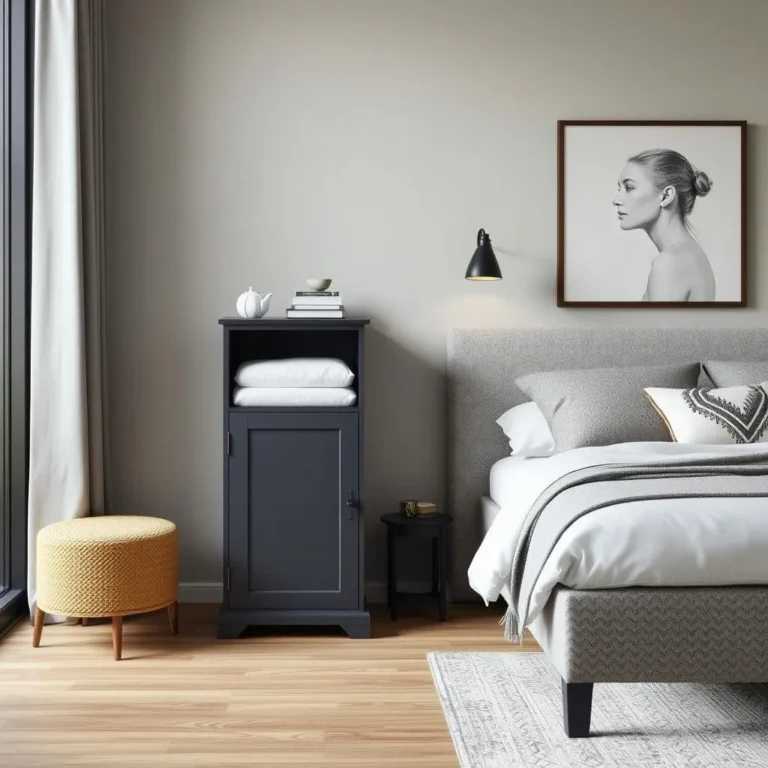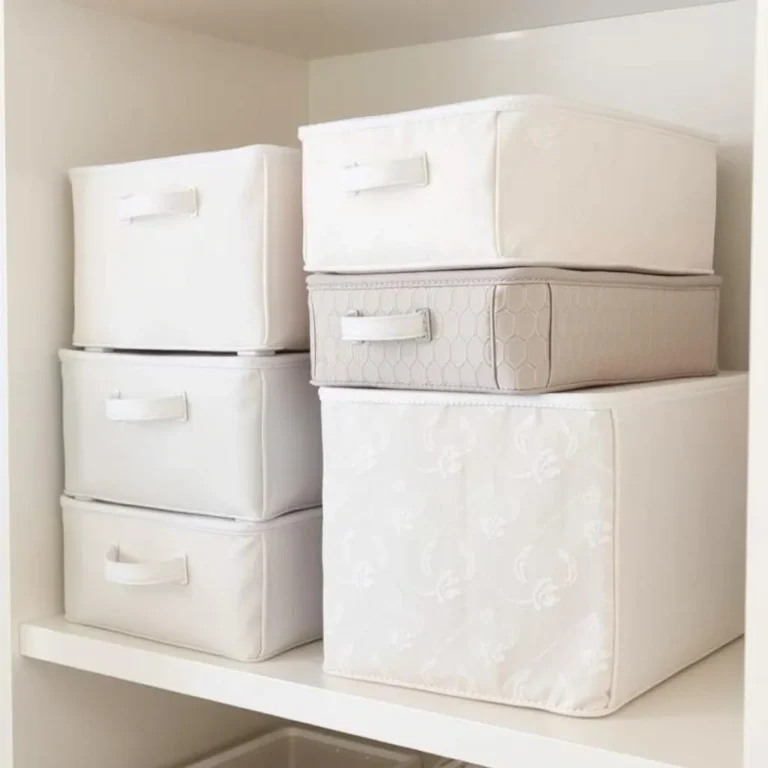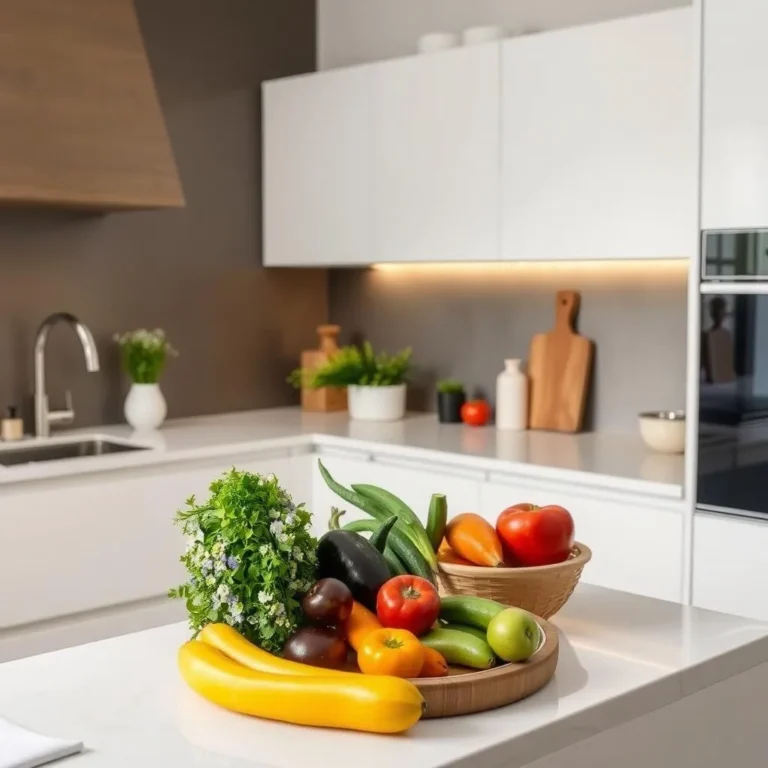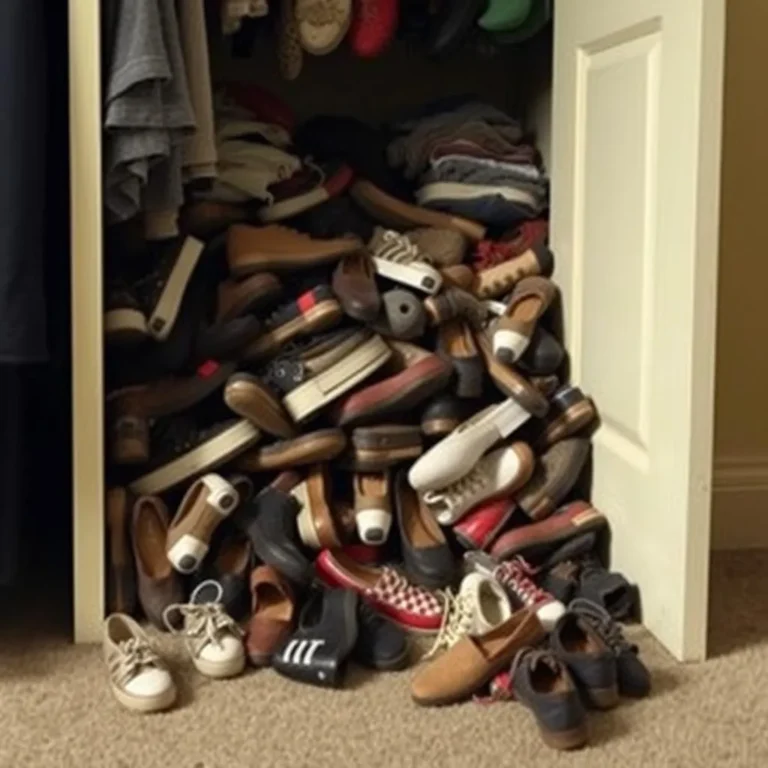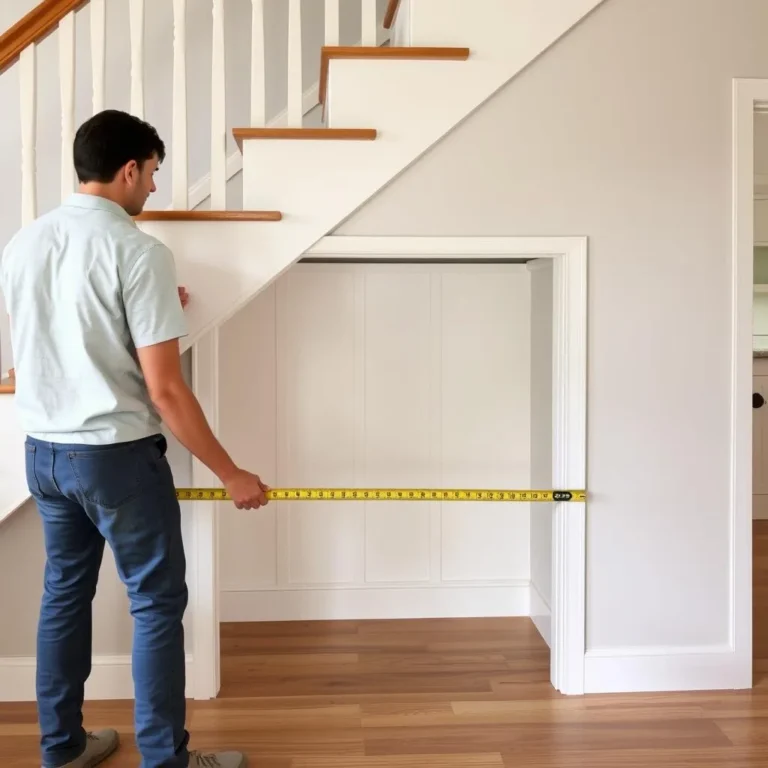Mudroom Closet: The Unsung Hero of Home Organization
- Introduction: The Importance of a Well-Organized Mudroom
1.1 The Chaos of Entryways
1.2 Mudrooms as a Solution - Planning Your Mudroom Closet: Size and Layout
2.1 Assessing Your Space
2.2 Maximizing Vertical Space
2.3 Choosing the Right Doors (Swinging, Sliding, Bi-fold) - Essential Features of a Mudroom Closet
3.1 Ample Hanging Space for Coats and Jackets
3.2 Dedicated Shoe Storage Solutions
3.3 Drawers for Accessories and Smaller Items
3.4 Open Shelving for Easy Access - Optimizing Storage with Creative Solutions
4.1 Utilizing Vertical Space with Hanging Organizers
4.2 Built-in Bench Seating with Storage
4.3 Customizable Shelves and Bins - Mudroom Closet Style and Design Considerations
5.1 Matching Your Home’s Aesthetic
5.2 Choosing Materials (Wood, Metal, Laminate)
5.3 Lighting for Functionality and Ambiance - DIY Mudroom Closet Ideas
6.1 Repurposing Existing Closets
6.2 Building a Simple Closet System
6.3 Creative Storage Solutions on a Budget - Professional Installation vs. DIY
7.1 Pros and Cons of Each Approach
7.2 Cost Considerations - Maintaining Your Mudroom Closet: Tips and Tricks
8.1 Regular Decluttering
8.2 Seasonal Organization
8.3 Utilizing Storage Solutions Effectively - Choosing the Right Mudroom Closet System
9.1 Ready-to-Assemble (RTA) options
9.2 Custom-built solutions
9.3 Modular systems - Popular Mudroom Closet Styles
10.1 Farmhouse
10.2 Modern
10.3 Traditional - Integrating Technology
11.1 Smart Lighting
11.2 Charging Stations - Adding Personal Touches
12.1 Hooks for Bags and Keys
12.2 Mirrors for a Functional and Stylish Touch - Addressing Common Mudroom Challenges
13.1 Limited Space Solutions
13.2 High-traffic areas and durability - The ROI of a Well-Organized Mudroom
- Conclusion: Transforming Entryway Chaos into Organized Calm
Mudroom Closet: The Unsung Hero of Home Organization
Have you ever walked into your home, only to be greeted by a chaotic pile of shoes, coats, and bags scattered across the floor? It’s a common problem, but one that’s easily solved with the addition of a well-organized mudroom closet. Think of it as the unsung hero of your home’s organization, silently battling the daily onslaught of outerwear and footwear.
1. Introduction: The Importance of a Well-Organized Mudroom
Let’s face it, entryways can quickly become disaster zones. Without a designated space for storing everyday items, chaos reigns supreme. But what if I told you there was a simple solution to tame this wild west of outerwear and footwear? A well-designed mudroom closet transforms your entryway from a cluttered mess into a functional and stylish space.
1.1 The Chaos of Entryways
Imagine this: You arrive home, laden with groceries, a briefcase, and a wet umbrella. Where does everything go? Do you toss it all haphazardly onto chairs, creating a visual and potentially hazardous obstacle course? The struggle is real!
1.2 Mudrooms as a Solution
A mudroom closet is the answer to this everyday struggle. It provides a designated space to store coats, shoes, bags, and other frequently used items, keeping your entryway clear and your sanity intact. No more tripping over shoes or searching frantically for your keys!
2. Planning Your Mudroom Closet: Size and Layout
Before you even begin thinking about the color of the paint, you need a solid plan. Assess your available space meticulously. A well-planned closet maximizes space, regardless of its dimensions.
2.1 Assessing Your Space
Measure your available space carefully. Consider the width, depth, and height of the area you’ll be using for your mudroom closet. This detailed measurement will be crucial for selecting the right shelving, storage systems, and overall design.
2.2 Maximizing Vertical Space
Don’t underestimate the power of vertical space! Think tall shelving units, hanging organizers, and even a clever use of the space above the door. It’s amazing how much storage you can pack into a relatively small footprint.
2.3 Choosing the Right Doors (Swinging, Sliding, Bi-fold)
The type of door you choose can significantly impact the functionality of your mudroom closet. Swinging doors might take up valuable floor space, whereas sliding or bi-fold doors offer a more space-saving solution. Consider your available space and traffic flow when making this choice.
3. Essential Features of a Mudroom Closet
A truly effective mudroom closet is more than just a place to shove things. It’s a strategically designed storage system.
3.1 Ample Hanging Space for Coats and Jackets
Sufficient hanging space is a must-have. Consider installing a double rod to maximize vertical space and accommodate different lengths of outerwear.
3.2 Dedicated Shoe Storage Solutions
Think vertical shoe racks, cubbies, or even a built-in shoe bench. The key is to keep shoes organized and off the floor.
3.3 Drawers for Accessories and Smaller Items
Drawers are invaluable for storing scarves, gloves, hats, and other small accessories. Choose drawers with dividers for even better organization.
3.4 Open Shelving for Easy Access
Open shelving provides easy access to items you use frequently, like hats, bags, or umbrellas.
4. Optimizing Storage with Creative Solutions
Now it’s time to unleash your inner organizational guru!
4.1 Utilizing Vertical Space with Hanging Organizers
Over-the-door organizers and hanging shelves are fantastic for utilizing otherwise wasted vertical space. They’re perfect for storing smaller items that would otherwise get lost in the clutter.
4.2 Built-in Bench Seating with Storage
A built-in bench with storage underneath provides a practical and stylish seating area while simultaneously offering hidden storage for shoes, boots, or extra blankets. 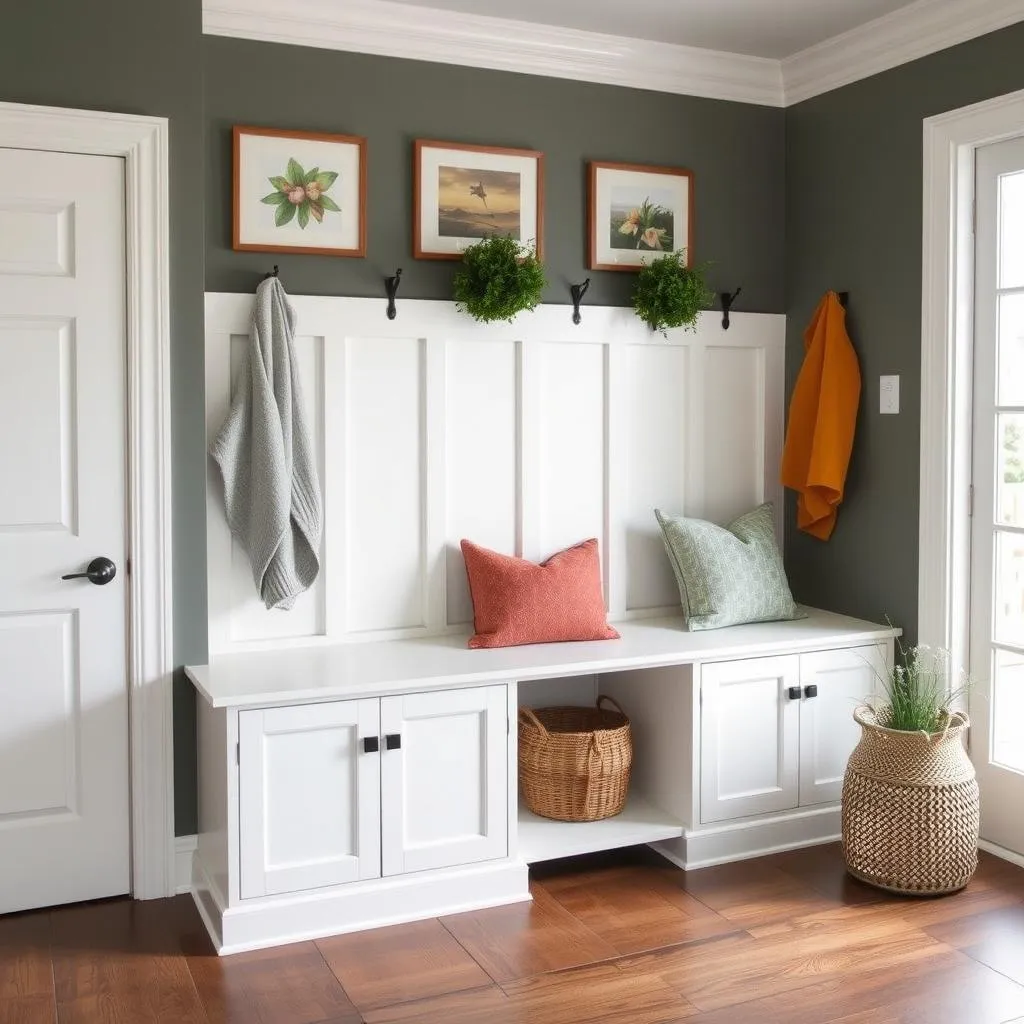
4.3 Customizable Shelves and Bins
Customizable shelves and bins allow you to tailor your storage solutions to your specific needs. Adjust shelf heights and use labeled bins to maintain order.
5. Mudroom Closet Style and Design Considerations
Let’s make this not just functional, but beautiful too!
5.1 Matching Your Home’s Aesthetic
Your mudroom closet should complement your home’s overall style. Consider the colors, materials, and hardware to ensure a cohesive look.
5.2 Choosing Materials (Wood, Metal, Laminate)
The materials you choose will impact the look and durability of your closet. Wood offers a classic and warm feel, while metal offers a more industrial aesthetic. Laminate is a budget-friendly and durable option.
5.3 Lighting for Functionality and Ambiance
Good lighting is essential for easy access and a welcoming atmosphere. Consider installing recessed lighting or a stylish pendant light.
6. DIY Mudroom Closet Ideas
If you’re feeling crafty, there are tons of DIY options!
6.1 Repurposing Existing Closets
Transform an existing closet into a mudroom closet with a few simple modifications. Add shelves, hooks, and a fresh coat of paint for a quick update.
6.2 Building a Simple Closet System
With some basic carpentry skills, you can build a simple closet system from scratch. Numerous online tutorials can guide you through the process.
6.3 Creative Storage Solutions on a Budget
Use inexpensive materials like repurposed crates, baskets, and jars to create unique and budget-friendly storage solutions. 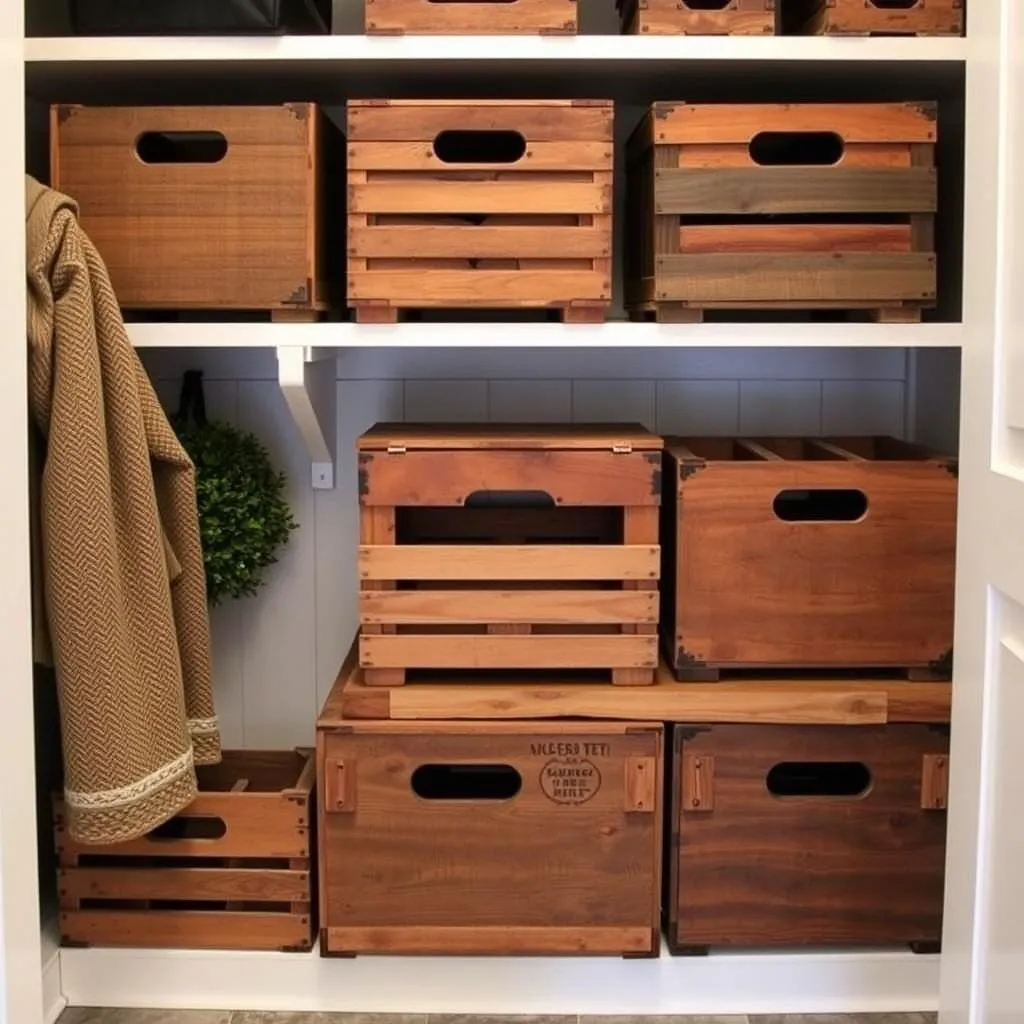
7. Professional Installation vs. DIY
Weigh the pros and cons before you start hammering!
7.1 Pros and Cons of Each Approach
Professional installation guarantees a high-quality finish and often offers warranties. DIY projects can be more cost-effective but require time and skill.
7.2 Cost Considerations
Factor in the cost of materials, labor (if hiring a professional), and any necessary tools.
8. Maintaining Your Mudroom Closet: Tips and Tricks
A little maintenance goes a long way!
8.1 Regular Decluttering
Regularly declutter your mudroom closet to prevent it from becoming overwhelmed with unnecessary items.
8.2 Seasonal Organization
Adjust your storage solutions seasonally to accommodate changes in clothing and gear.
8.3 Utilizing Storage Solutions Effectively
Make sure you’re utilizing your storage solutions to their full potential. Label everything and keep items neatly organized.
9. Choosing the Right Mudroom Closet System
There are so many options out there – it can be overwhelming!
9.1 Ready-to-Assemble (RTA) options
RTA systems are affordable and convenient but may require some assembly.
9.2 Custom-built solutions
Custom-built solutions offer maximum flexibility and personalization but tend to be more expensive.
9.3 Modular systems
Modular systems allow you to customize your closet as your needs change.
10. Popular Mudroom Closet Styles
Find the perfect style to match your home!
10.1 Farmhouse
Farmhouse style mudrooms often feature light wood, metal accents, and a rustic feel.
10.2 Modern
Modern mudrooms are clean, minimalist, and often incorporate sleek lines and neutral colors.
10.3 Traditional
Traditional mudrooms tend to feature classic designs, rich wood tones, and ornate details.
11. Integrating Technology
Keep your mudroom ahead of the curve!
11.1 Smart Lighting
Smart lighting allows you to control your mudroom lighting remotely, adding both convenience and ambiance.
11.2 Charging Stations
Built-in charging stations keep your devices powered up and organized.
12. Adding Personal Touches
Make it your own!
12.1 Hooks for Bags and Keys
Hooks provide a convenient place to hang bags and keys, keeping them easily accessible.
12.2 Mirrors for a Functional and Stylish Touch
A mirror adds both functionality and style to your mudroom. 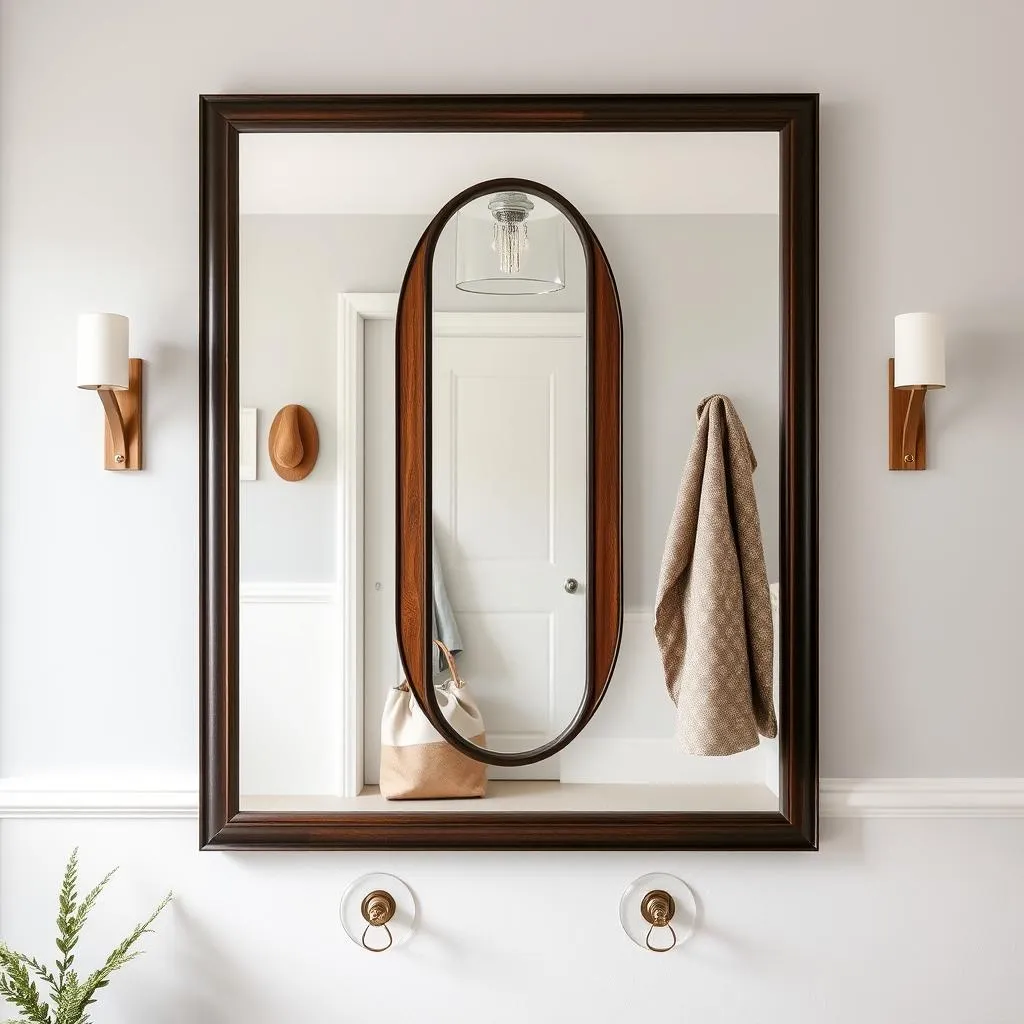
13. Addressing Common Mudroom Challenges
Let’s tackle those pesky problems head-on!
13.1 Limited Space Solutions
Even small spaces can be transformed into functional mudrooms with creative storage solutions.
13.2 High-traffic areas and durability
Choose durable materials that can withstand the wear and tear of a high-traffic area.
14. The ROI of a Well-Organized Mudroom
A well-organized mudroom isn’t just about aesthetics; it’s an investment in your peace of mind.
A well-organized mudroom improves your home’s functionality, increases its value, and boosts your overall well-being! It’s a win-win situation.
15. Conclusion: Transforming Entryway Chaos into Organized Calm
A well-designed mudroom closet is more than just a storage space; it’s a statement of organization and functionality. By incorporating the elements discussed here, you can transform your entryway from a source of daily stress into a welcoming and organized haven.
FAQs:
- What is the average cost of a mudroom closet? The cost varies greatly depending on size, materials, and whether you opt for DIY or professional installation. Expect to spend anywhere from a few hundred to several thousand dollars.
- How much space do I need for a mudroom closet? Even a small closet can be highly functional with clever storage solutions. However, the larger the space, the more options you have.
- Can I install a mudroom closet myself? Yes, many DIY options are available, ranging from repurposing an existing closet to building a simple system. However, more complex installations might require professional help.
- What are some essential items to include in a mudroom closet? Essentials include hanging space for coats, dedicated shoe storage, drawers for smaller items, and open shelving for easy access.
- How can I maintain a clean and organized mudroom closet? Regular decluttering, seasonal organization, and the effective use of storage solutions are key to maintaining a clean and organized mudroom closet.

